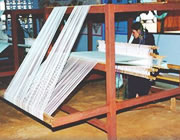Occupational promotion is indirectly related to the objectives of the Royal Development Projects particularly the activities in the Royal Development Study Centres which serve as the centre of study, research and experimentation of development models suitable for the environment and occupations of the local people.
|

|
Occupational promotion activities in the Centres aim to encourage the people to earn supplementary income to raise their families and thus, to become self-supporting. These programmes are the Agricultural Technology Transfer and Training Programme for the surrounding villages of the Centres, the SUPPORT Projects, the Small Palm Oil Industry Promotion Programme, the Fruit and Flower Propagation Development Service Centre at Ban Rai, Chiang Mai Province and many others. Examples of this type of project are:
|
The Supplementary Occupations and Related Techniques (SUPPORT) Projects: Highly recognizing the value of national arts and cultural heritage, Her Majesty Queen Sirikit graciously gave an initiative to restore and promote these arts and heritage. The initiative led to the establishment of the Supplementary Occupations and Related Techniques Foundation (SUPPORT Foundation) on July 21, 1976 with the purpose of assisting the low-income farmers who face obstacles in crop cultivation due to fluctuations of the weather conditions and receive insufficient earning to raise the family.

At the same time, the beautiful arts and crafts of the country, which have flourished since the ancient times, are disappearing because of the economy and the way of life of the Thai people at present.
More than 150 SUPPORT Training Centres were set up throughout the country with an aim of providing additional skills for farmers to supplement their income on a regular basis independent of the climatic conditions as it used to be in the past. Her Majesty the Queen emphasizes the utilization of the readily available materials in the locality to create the handicraft works in the first place. In addition, after having paid many royal visits to the remote areas, Her Majesty selected members of the poor landless families that have many children all over the country to receive training in various SUPPORT training centres such as the Chitralada SUPPORT Training Centre which is the largest that conducts the training courses in exclusive handicrafts, namely nielloware, silverware, cloth weaving, etc. In addition, Her Majesty personally leads the use of the handicraft products such as silk clothes and handicraft works as a model for people to follow her style as a new trend. Thus, it is a familiar sight to see Her Majesty dressed in royal clothes made from handicraft on various occasions, which in fact is her ingenious tactics to promote the handicraft works to become widely well-known.
The Royal-initiated Huai Ongkod Project

The Royal-initiated Huai Ongkod Project: The project, located in Kanchanaburi Province, was set up to provide guidelines for developing land appropriate to its conditions with the idea of enabling the villagers to live and make a living in accordance with the principle of rehabilitation and creation of a balance of the ecological system. The practices conducted at the project involved integrated farming and chemical-free vegetables growing, reduction of the use of chemicals, chicken raising, and handicraft making. The aim of the project was to offer to the people a means of making a living in a sustainable manner.